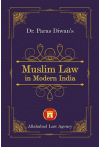- Author(s): Paras Diwan
- Publisher: Allahabad Law Agency
- Edition: 13 Ed Rp 2019
- ISBN 13 9789380231198
- Approx. Pages 404 + Contents
- Format Paperback
- Delivery Time Normally 7-9 working days
.........................................................................................................................
Description
The Shah Bano case has been a great watershed case in India. Its importance is not merely confined to Muslim law. It has wider ramifications—in the field of women rights especially when we are talking a lot about women empowerment, in the field of uniform civil code et al. This case had led to the passing of the controversial Muslim Women (Protection of Rights on Divorce) Act, 1984. Gujarat High Court (A.A. Abdalla v A.B.M. Saiyadbhal AIR 1988 Guj. 141) was the first one to interpret the Act. M.B. Shah, J.. had interpreted it in the light of the very nomenclature of the Act that it has been enacted to protect the Muslim women's rights on divorce. The learned judge had very rightly observed that a provision has to be made for the reasonable and fair maintenance for the divorced wife within the period of iddat for her future. This Act was challenged in Danial Latifi v. Union of India. (AIR 2001 SC 3958). While upholding the validity of the Act, the Supreme Court has virtually upheld the observations made in A.A. Abdulla.
In Shabana Bano v. Imran Khan. (AIR 2010 SC 305). the Supreme Court has ruled that she may apply for maintenance even after iddat period. She can apply as long as she does not marry.
Article 44 of our Constitution has extolled our State to give all the citizens of the country a uniform civil code throughout the territory of India. Indian State did endeavour to reform Indian personal laws including Muslim law. It succeeded in giving uniform civil code to Hindus. Sikhs and Jains but did not succeed elsewhere. Though there was a proposal to reform Muslim personal law in 1963 but the effort was vitiated by the orthodox section of the community. However, judicial activism continues to remind the government to do its duty towards uniform civil code (Sarla Mudgal v. Union of India, AIR 1995 SC 1531).
As in previous editions, so in this, we have not remained with the mere exposition of law but have approached the subject in the spirit of constructive criticism. We think as scholars we owe this duty towards society. On the matters we found it difficult to agree with the views of eminent judges and jurists and other pundits of law, we have ventured to suggest a different approach. At the same time we have endeavoured to present their point of view faithfully. Though some criticisms and strictures in this book may appear somewhat strong, but these have been made with the hope that these will help in the development of law and in bringing about the desired social change.
.........................................................................................................................
Contents
Chapter I Who is a Muslim : Application of Muslim law
Chapter II Historical Antecedents, Concepts and Schools of Muslim Law
Chapter III Sources of Muslim Law
Chapter IV Marriage
Chapter V Mahr (Dower)
Chapter VI Dissolution of Marriage and Matrimonial Reliefs
Chapter VII Parentage : Illegitimate and Legitimate Childern
Chapter VIII Guardianship and Hizanat
Chapter IX Maintenance
Chapter X The Muslim Women (Protection of Rights on Divorce) Act, 1986
Chapter XI Hiba (Gifts)
Chapter XII Administration of Estates
Chapter XII Succession
Chapter XIV Wassiyat (wiills)
Chapter XV Shuffaa (Pre-emption)
Chapter XVI Wakfs
Appendices
Table of cases
.........................................................................................................................

